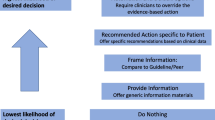Abstract
CONTEXT: The premise of the problem-oriented medical record is that an accurately defined problem list will directly result in more thorough and efficient patient care. However, little empirical evidence exists demonstrating improved patient outcomes as a result of an adequately structured problem list.
OBJECTIVE: To determine the impact of problem list documentation of heart failure on the likelihood that evidence-based pharmacotherapy has been prescribed.
DESIGN: Cross-sectional study.
SETTING: Community-based primary care clinics in Portland, Oregon.
SUBJECTS: Active patients in the network with a left ventricular ejection fraction of 40% or less, with and without heart failure, in their structured problem list.
MAIN OUTCOME MEASURES: The proportion of patients prescribed medications with known benefits for systolic dysfunction.
RESULTS: In this group of patients with known systolic dysfunction, the likelihood of therapy with either an angiotensin converting enzyme inhibitor or angiotensin II receptor blocker was higher in patients who had heart failure listed on their problem list compared to patients who did not (92.2% vs 76.7%; P<.05). This association remained after statistical adjustment for age, gender, and ejection fraction. Patients with accurate problem list entries were also more likely to receive digoxin (61.1% vs 36.7%; P=.001) and spironolactone (26.7% vs 13.3% P=.025). There were no differences in the use of beta-blockers between the 2 groups.
CONCLUSION: Accurate documentation of heart failure on the problem list of patients with known systolic dysfunction is associated with a significant increase in the likelihood of being prescribed medications with known clinical benefit.
Similar content being viewed by others
References
Weed LL. Medical records that guide and teach. N Engl J Med. 1968;278:593–600.
Wennberg JE, Gittelsohn AM. Small area variations in health care delivery. Science. 1973;183:1102–8.
Chassin MR. Is health care ready for Six Sigma quality? Milbank Q. 1998;76510:565–91.
Eddy DM. The challenge. JAMA. 1990;263:287–90.
Institute of Medicine. Crossing the Quality Chasm: A New Health System for the 21st Century. Washington, DC: National Academy Press; 2001.
Simborg DW, Starfield BH, Horn SD, Yourtee SA. Information factors affecting problem follow-up in ambulatory care. Med Care. 1976;14:848–56.
Hunt SA, Baker DW, Chin MH, et al. ACC/AHA guidelines for the evaluation and management of chronic heart failure in the adult: executive summary. A report of the American College of Cardiology/American Heart Association Task Force on Practice Guidelines (Committee to Revise the 1995 Guidelines for the Evaluation and Management of Heart Failure). J Am Coll Cardiol. 2001;38:2101–13.
Consensus recommendations for the management of chronic heart failure. On behalf of the membership of the advisory council to improve outcomes nationwide in heart failure. Am J Cardiol. 1999;83:1A-38A.
Khalil ME, Basher AW, Brown J, Edward J, Alhaddad IA. A remarkable medical story: benefits of angiotensin-converting enzyme inhibitors in cardiac patients. J Am Coll Cardiol. 2001;37:1757–64.
Packer M, Poole-Wilson PA, Armstrong PW, et al. Comparative effects of low and high doses of the angiotensin-converting enzyme inhibitor, lisinopril, on morbidity and mortality in chronic heart failure. Circulation. 1999;100:2312–8.
Univasc [package insert]. Milwaukee, WI: Schwarz Pharma; 2001.
Lotensin [package insert]. East Hanover, NJ: Novartis; 2002.
Pfeffer MA, Braunwald E, Moye LA, et al. Effect of captopril on mortality and morbidity in patients with left ventricular dysfunction after myocardial infarction. Results of the survival and ventricular enlargement trial. The SAVE Investigators. N Engl J Med. 1992;327:669–77.
McAlister FA, Teo KK, Taher M, et al. Insights into the contemporary epidemiology and outpatient management of congestive heart failure. Am Heart J. 1999;138:87–94.
Hosmer DW, Lemeshow S. Applied Logistic Regression. New York, NY: Wiley-Interscience; 2000.
Flather MD, Yusuf S, Kober L, et al. Long-term ACE-inhibitor therapy in patients with heart failure or left-ventricular dysfunction: a systematic overview of data from individual patients. Lancet. 2000;355:1575–81.
The sixth report of the Joint National Committee on prevention, detection, evaluation, and treatment of high blood pressure. Arch Intern Med. 1997;157:2413–46.
Packer M, Bristow MR, Cohn JN, et al. The effect of carvedilol on morbidity and mortality in patients with chronic heart failure. U.S. Carvedilol Heart Failure Study Group. N Engl J Med. 1996;334:1349–55.
Hennekens CH, Buring JE. Epidemiology in Medicine. Boston, MA: Little, Brown and Company; 1987.
Donabedian A. Evaluating the quality of medical care. Milbank Mem Fund Q. 1966;44(suppl):166–206.
Author information
Authors and Affiliations
Corresponding author
Additional information
None of the authors has any conflicts of interest to report.
Funding by Astra Zeneca Pharmaceuticals. Nicola Payne, MPhil, consultant for Providence Medical Group, assisted with statistical evaluation.
Rights and permissions
About this article
Cite this article
Hartung, D.M., Hunt, J., Siemienczuk, J. et al. Clinical implications of an accurate problem list on heart failure treatment. J GEN INTERN MED 20, 143–147 (2005). https://doi.org/10.1111/j.1525-1497.2005.40206.x
Accepted:
Issue Date:
DOI: https://doi.org/10.1111/j.1525-1497.2005.40206.x




